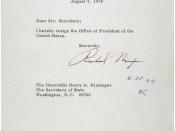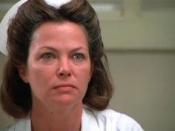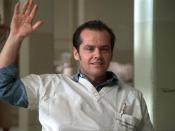"It don't make a bit of sense to me. If that's what bein' crazy is, than I'm senseless, out of it, gone down the road whacko. But no more, no less." In this telling and ultimately ironic statement, Jack Nicholson, as Randall Patrick McMurphy, reveals one of the underlying questions of Milos Forman's 1975 adaptation of One Flew Over the Cuckoo's Nest: what does it really mean to be crazy? Set in a psychological institution, the film presents a network of control and order that is reprehensible because it sneakily manipulates many mostly-sane patients and worsens or at least perpetuates the very illnesses it is designed to remedy. McMurphy, who is transferred to the hospital after faking insanity, immediately becomes a heroic agitator of this network. The film chronicles his struggle with Nurse Ratched, whose domineering passive-aggressive and obsessive-compulsive treatment of her patients seems far more terrible and socially unacceptable than their humorous psychotic behavior.
The question of what constitutes insanity is a powerful metaphor throughout the film for questioning the social and moral order of American society.
In the context of America in 1975, this question has pertinent social implications as well. Disillusionment replaced optimism as North Vietnam finally overran South Vietnam in April of 1975. Democracy had fallen to communism, and America had unequivocally lost its first war. In August of 1974, Nixon had resigned after the Watergate scandal, following Spiro Agnew's resignation the year before. Additionally, Israeli and Arab unrest had intensified, and OPEC threw the economy, arguably America's object of greatest pride, into recession and high inflation. Cuckoo's Nest, much like the vast social critiques of the post-World War I and II eras, served as a voice of anxiety to question the moral order that seemed to be disintegrating.
Though the film is pickled with scenes contrasting McMurphy's triumphant defiance with Ratched's order and control, two are particularly useful for illustrating its larger social significance. In the first, the conflict begins when Nurse Ratched refuses to allow McMurphy to watch the World Series. To justify her reasoning, she objects, noting that some of the patients may not want such a disruption, and eventually suggests that it may be harmful to them. Angrily, McMurphy sits in front of a blank television and narrates a ficticious baseball game. The other patients, joining him defiantly, crowd around McMurphy and even begin to celebrate, chanting "Home Run! A Home Run!" Here, Ratched's reasoning and logic for prohibiting the viewing seems hollow and unjust. The inoffensiveness of McMurphy's request is obvious after the only coherent patients express interest in the series. So, Ratched's control is both unnecessary and unfair, while McMurphy's rebellion is harmless and unthreatening. Furthermore, the scene is representative of the fresh joy and laughter he brought to all the patients throughout the film.
Another example of this contrast is the ritual where the patients wait in line to receive their medicine while listening to slow, almost tranquilizing music. When McMurphy reaches the front of the line, at the height of the tension between him and Nurse Ratched, he smashes the glass she is standing behind. Although his rebellion was dangerous in this instance, it still feels less offensive than the hypnotic order of the ritual, and Ratched's insistence on repeating it every day. However, it is certainly indicative of McMurphy's growing lack of control, and how the order of the system is causing even his insanity, which he resists ultimately by violence.
Finally, after McMurphy has lost the battle and died pathetically, Nurse Ratched fades into the institution itself, and the patients return to order. She becomes part of a much greater malady, which is only partially defeated by Chief Bromden's escape. This malady is the underlying code and structure of the American social order, which is not noticed explicitly in the film or in life. Cuckoo's Nest, though it also was a serious critique of psychiatric treatment in general, served mostly as a question of what constitutes sanity or right in a world that is breaking down. For McMurphy and perhaps many Americans in the mid-seventies, the line was difficult to draw.





